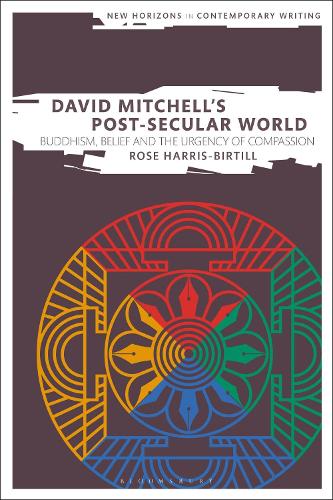
David Mitchell's Post-Secular World: Buddhism, Belief and the Urgency of Compassion
(Hardback)
Publishing Details
David Mitchell's Post-Secular World: Buddhism, Belief and the Urgency of Compassion
By (Author) Dr Rose Harris-Birtill
Bloomsbury Publishing PLC
Bloomsbury Academic
10th January 2019
10th January 2019
United Kingdom
Classifications
Tertiary Education
Non Fiction
Literary studies: fiction, novelists and prose writers
823.92
Physical Properties
Hardback
256
Width 156mm, Height 234mm
540g
Description
Since the publication of Ghostwritten (1999), David Mitchell has rapidly established himself as one of the most inventive and important British novelists of the 21st century. In this landmark study, Rose Harris-Birtill reveals the extent to which Mitchell has created an interconnected fictional world across the full run of his writing. Covering Mitchells complete fictions, from bestselling novels such as Cloud Atlas (2004), The Bone Clocks (2014) and number9dream (2001), to his short stories and his libretti for the operas Sunken Garden and Wake, this book examines how Buddhist influences inform the ethical worldview that permeates his writing. Using a comparative theoretical model drawn from the Tibetan mandala to map Mitchells fictional world, Harris-Birtill positions Mitchell as central to a new generation of post-secular writers who re-examine the vital role of belief in galvanizing action amidst contemporary ecological, political and humanitarian crises. David Mitchells Post-Secular World features two substantial new interviews with the author, a chronology of his fictions and a selected bibliography of important critical writings on his work.
Reviews
Rose Harris-Birtill persuasively argues that Mitchell's work--including libretti, short stories, and novels--maps a post-secular metaphysics and expresses a compassionate global ethics. In its comprehensive sweep and incisive arguments, this book sets a standard for Mitchell criticism to date and to come. * Paul A. Harris, Professor of English, Loyola Marymount University, USA *
Highly original in its approach and informed by a deep encyclopedic knowledge of Mitchells entire oeuvre including his short stories, libretti, non-fiction and interviews, this is a true eye-opener of a study which skillfully captures the authors design of a cosmopolitan world-system intent upon galvanising compassionate ethical action in his readers. * Professor Berthold Schoene, Professor of English and Faculty Head of Research and Knowledge Exchange for Arts and Humanities, Manchester Metropolitan University *
Mandalic thinking lies at the heart of this ground-breaking literary criticism which marks the start of an inter-connected multi-faceted rendering of lifes urgent needs: compassion and ethical action. The zeitgeist of a post-secular age faced with humanitarian and ecological crises demands nothing less. * Rosita Dellios, Associate Professor of International Relations Faculty of Society and Design, Bond University, Australia *
In this study, Rose Harris-Birtill offers a persuasive account of the ethical implications of David Mitchells writing that points towards a different way of mapping contemporary literatures ethical engagement at a time of ongoing crisis. Deftly negotiating previous readings of his oeuvre, Harris-Birtill presents the Tibetan Buddhist mandala as an interpretive framework for tracing real and imagined topographies within Mitchells novels, short fiction and libretti. In so doing, she offers a compelling reading of Mitchells works as articulations of a continuous fictional world in which moments of compassionate action reverberate across his texts. * Dr Caroline Edwards, Senior Lecturer in Modern & Contemporary Literature Birkbeck, University of London *
David Mitchells Post-Secular World is an outstanding work of contemporary scholarship. Harris-Birtill has produced the most rigorous and comprehensive study of Mitchells work to date. Attentive close reading and supple argument is supported by impeccable and exhaustive research. The use of the mandala as a comparative framework to map Mitchells storyverse is an entirely original critical and theoretical approach in contemporary literary studies. Its beauty here lies in its dual effectiveness in reconceptualising both the structure of Mitchells work, and his ethical and philosophical concerns. This book will be the definitive critical work on Mitchells oeuvre for many years to come, but it is also a crucial contribution to theory and criticism of the post-secular in contemporary literature more widely. * Dr Sarah Dillon, Clare College, University of Cambridge *
In this compellingly argued and smartly written study, Rose Harris-Birtill offers an important new perspective for assessing the work of one of this centurys key writers. Unlike previous studies, David Mitchells Post-Secular World addresses the extensive cross-cultural, cross-temporal narrative worldor macronovelthat Mitchell is still in the process of creating, and it insightfully demonstrates that not only Mitchells novels but also his short stories and libretti are integral, vitally connected components of this world. Harris-Birtill employs the Tibetan Buddhist mandala for mapping this world-system, thus bringing to light the deeply ethical nature of Mitchells vision. She concurrently explores the mandalas meaning, appropriation, and deployment in contemporary culture. Harris-Birtills engaging interviews with Mitchell provide enlightening supplements to the critical analyses. This text should prove an invaluable resource to scholars interested in David Mitchells fiction and the literature of the twenty-first century, as well as those who wish to understand the mandalas cultural significance. * Dr. Jo Alyson Parker, Professor of English, Saint Joseph's University, USA *
Author Bio
Rose Harris-Birtill is a Post-Doctoral Researcher at the University of St Andrews, UK.
